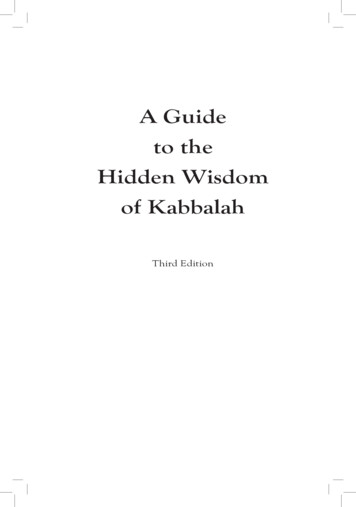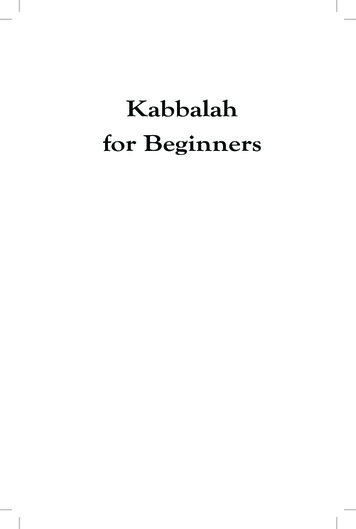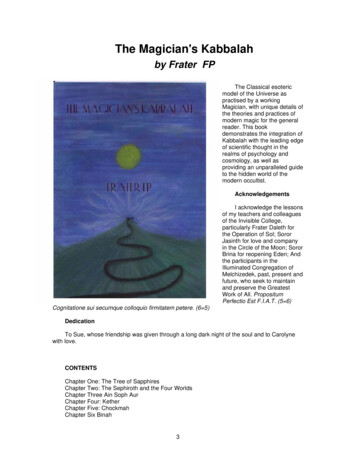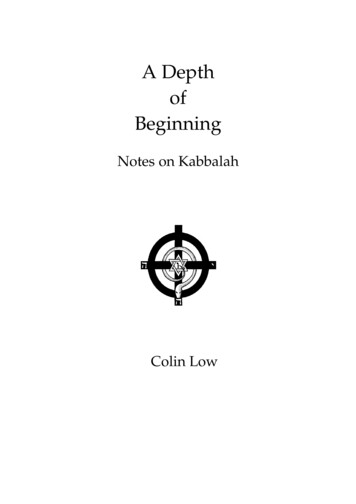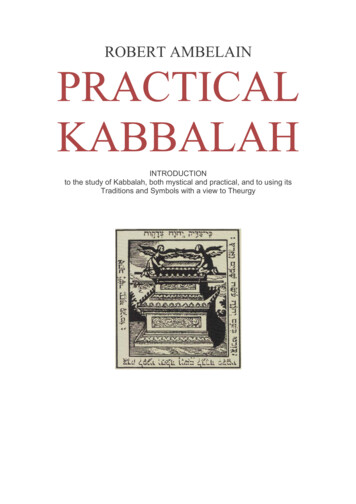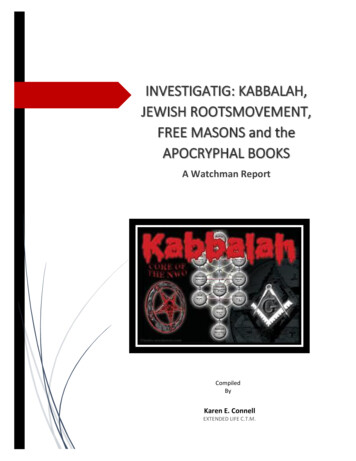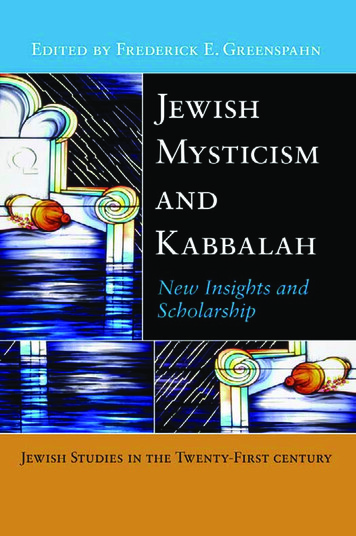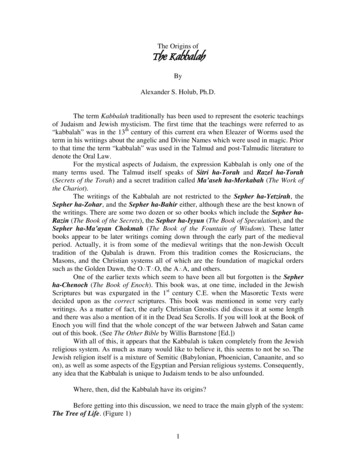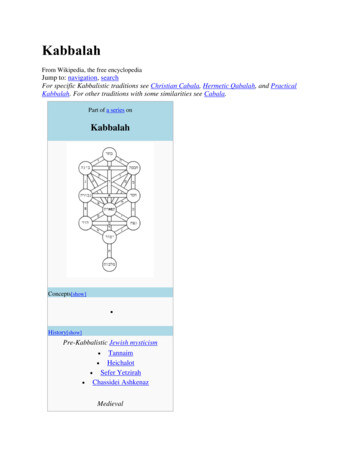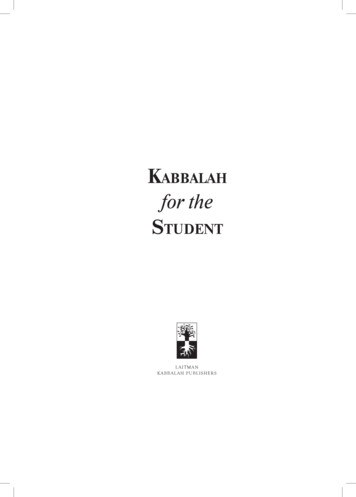
Transcription
Kabbalahfor theStudentLAIT M A NKABBALAH P UBLISHERS
KABBALAH FOR THE STUDENTCopyright 2008 by MICHAEL LAITMANAll rights reservedPublished by Laitman Kabbalah Publisherswww.kabbalah.info info@kabbalah.info1057 Steeles Avenue West, Suite 532, Toronto, ON, M2R 3X1, CanadaBnei Baruch USA, 2009 85th street, #51, Brooklyn, NY 11214, USAPrinted in CanadaNo part of this book may be used or reproduced in any manner without writtenpermission of the publisher, except in the case of brief quotations embodied incritical articles or reviews.Library of Congress Cataloging-in-Publication DataKabbalah for the student. — — 1st ed.p. cm.ISBN 978-1-897448-15-11. Cabala. I. Ashlag, Yehudah. II. Ashlag, Barukh Shalom, ha-Levi,1907-1991. III. Laitman, Michael.BM525.K27 2009296.1’6— —dc222008040178Copy Editor: Claire GerusAssociate Editor: Michael R. KelloggProofreading: Natasha SigmundLayout: Luba VisotzkiDiagrams: Alex RainCover Design: Rami YanivPrinting & Post Production: Uri LaitmanTranslator & Executive Editor: Chaim RatzFIRST EDITION: AUGUST 2009First printing
Table of ContentsForeword (Bnei Baruch) 5The Tree of Life – a Poem (Rav Isaac Luria) 7Time for Spiritual Attainment 11Time to Act (Rav Yehuda Ashlag) 13Disclosing a Portion, Covering Two (Rav Yehuda Ashlag) 15The Essence of the Wisdom of Kabbalah (Rav Yehuda Ashlag) 21The Teaching of the Kabbalah and Its Essence (Rav Yehuda Ashlag) 31The Essence of Religion and Its Purpose (Rav Yehuda Ashlag) 51Body and Soul (Rav Yehuda Ashlag) 59Exile and Redemption (Rav Yehuda Ashlag) 65A Speech for the Completion of The Zohar (Rav Yehuda Ashlag) 69Peace in the World (Rav Yehuda Ashlag) 83The Wisdom of Kabbalah and Philosophy (Rav Yehuda Ashlag) 99Introduction to The Book of Zohar (Rav Yehuda Ashlag) 109A Handmaid that Is Heir to Her Mistress (Rav Yehuda Ashlag) 147Messiah’s Shofar (Rav Yehuda Ashlag) 153Kabbalists Write about the Wisdom of Kabbalah (Assorted Authors) 157A Prayer before a Prayer (excerpt from Noam Elimelech) 183Spiritual Attainment 187Divinity in Exile (Rav Yehuda Ashlag) 189The Reason for the Heaviness in the Work (Rav Yehuda Ashlag) 193Lishma Is an Awakening from Above (Rav Yehuda Ashlag) 195Support in the Torah (Rav Yehuda Ashlag) 199Habit Becomes Second Nature (Rav Yehuda Ashlag) 203The Difference between a Shade of Kedusha and a Shade of Sitra Achra (Rav Yehuda Ashlag) 205The Essence of One’s Work (Rav Yehuda Ashlag) 207Lishma (Rav Yehuda Ashlag) 208The Time of Ascent (Rav Yehuda Ashlag) 211You Who Love the Lord Hate Evil (Rav Yehuda Ashlag) 213Raising the Slave through the Ministers (Rav Yehuda Ashlag) 214PARDESS (Rav Yehuda Ashlag) 217—Sit and Do Nothing Better (Rav Yehuda Ashlag) 223If I Am Not for Me, Who Is for Me? (Rav Yehuda Ashlag) 224Walking the Path of Truth (Rav Yehuda Ashlag) 227One Is Where One Thinks (Rav Yehuda Ashlag) 231An Allegory about the Rich Man’s Son in the Cellar (Rav Yehuda Ashlag) 232The Lord Is Thy Shade (Rav Yehuda Ashlag) 235The Labor Is the Most Important (Rav Yehuda Ashlag) 236Association of Mercy with Judgment (Rav Yehuda Ashlag) 237Society as a Condition for Attaining Spirituality 239Matan Torah (The Giving of the Torah) (Rav Yehuda Ashlag) 241
The Arvut (Mutual Guarantee) (Rav Yehuda Ashlag) 251The Peace (Rav Yehuda Ashlag) 261The Message in Matan Torah (Bnei Baruch) 277Unity of Friends (Rav Yehuda Ashlag) 281Love of Friends (Rav Yehuda Ashlag) 282The Influence of the Environment on a Person (Rav Baruch Ashlag) 283Purpose of Society (Rav Baruch Ashlag) 286Concerning Love of Friends (Rav Baruch Ashlag) 288They Helped Every One His Friend (Rav Baruch Ashlag) 290Purpose of Society (Rav Baruch Ashlag) 291What Does “Love Thy Friend as Thyself” Give Us? (Rav Baruch Ashlag) 293Love of Friends (Rav Baruch Ashlag) 294According to What Is Explained Concerning “Love Thy Friend” (Rav Baruch Ashlag) 295Which Keeping of Torah and Mitzvot Purifies the Heart (Rav Baruch Ashlag) 299Which Degree Should One Achieve? (Rav Baruch Ashlag) 301The First Degree When One Is Born (Rav Baruch Ashlag) 303Concerning the Importance of Society (Rav Baruch Ashlag) 305Concerning the Importance of Friends (Rav Baruch Ashlag) 308The Agenda of the Assembly (Rav Baruch Ashlag) 311Stages of Attainment 313Introduction to The Study of the Ten Sefirot (Rav Yehuda Ashlag) 315The Freedom (Rav Yehuda Ashlag) 375Concealment and Disclosure of the Face of the Creator (Rav Yehuda Ashlag) 403Preface to The Book of Zohar (Rav Yehuda Ashlag) 407Introduction to the Book, Panim Meirot uMasbirot (Rav Yehuda Ashlag) 431Matter and Form in the Wisdom of Kabbalah (Rav Yehuda Ashlag) 471This Is for Judah (Rav Yehuda Ashlag) 473The Acting Mind (Rav Yehuda Ashlag) 477Introduction to the Book, From the Mouth of a Sage (Rav Yehuda Ashlag) 479Introduction to the Preface to the Wisdom of Kabbalah (Rav Yehuda Ashlag) 489The Evolution of the Worlds 497Foreword to the Preface to the Wisdom of Kabbalah (Rav Michael Laitman) 499Preface to the Wisdom of Kabbalah (Rav Yehuda Ashlag) 565HaIlan (The Tree) (Rav Yehuda Ashlag) 645Explanation of the Article, Preface to the Wisdom of Kabbalah (Rav Baruch Ashlag) 663Preface to the Sulam Commentary (Rav Yehuda Ashlag) 681Talmud Eser Sefirot, Part One, Histaklut Pnimit (Rav Yehuda Ashlag) 721General Preface (Rav Yehuda Ashlag) 745Appendix A:Kabbalah Glossary (Bnei Baruch) Appendix B:Acronyms and Abbreviations (Bnei Baruch) Appendix C: Diagrams of the Spiritual Worlds (Bnei Baruch) About Bnei Baruch775811813857
ForewordWhy are we here? What does the future hold? How can we avoid sufferingand feel tranquil and safe? These are questions we would all like to answer.The wisdom of Kabbalah provides the answers to these questions and to manymore. It allows us to ask any question and experience the intimate, profoundfulfillment that comes with answering the deepest questions to the fullest. Thisis why it is called “the wisdom of the hidden.”Kabbalah teaches that we all want to enjoy. Kabbalists call this desire “thewill to receive delight and pleasure,” or simply, “the will to receive.” This desirepropels all of our actions, thoughts, and feelings, and Kabbalah depicts how wecan realize our desires and fulfill our wishes.Although the wisdom of Kabbalah often tends to sound technical orobscure, it is important to remember that this is a very practical science. Thepeople who mastered it and wrote about it were just like you and me. Theywere seeking solutions to the same questions we all want to answer: “Why arewe born?” “What happens after we die?” “Why is there suffering?” and “Can Iexperience lasting pleasure, and if so, how?” And when they found the answersto these questions and implemented them in their own lives, they wrote thetexts within this collection, so we may know them, too.In this compilation, you will find precise explanations as to how you canachieve that sublime feeling of unbounded pleasure and complete control ofyour life.Kabbalah teaches how to enjoy life here and now. It explains such conceptsas “the next world,” “souls,” “reincarnation,” and “life and death.”How can we, novices, experience such perceptions? How can we discoverthe true picture of reality?5
6Kabbalahfor theStudentEach of us builds his or her own priorities in life. Some matters are moreimportant to us, some are less so, and some we prefer to put off. But regardlessof the level of importance, we categorize our priorities according to a singlemeasurement: our purpose in life.Some people will strive tirelessly for love, some crave money, and othersdesire honor or knowledge. But most people prefer not to put all their eggsin one basket by focusing on fulfilling one desire. They settle for a little ofeverything and suppress any strong desire that emerges in them and demandstoo much of their attention.The Kabbalists who wrote the texts you will read here are of the first,uncompromising kind. They set a very clear goal before them: to showhumankind how to achieve eternal life—filled with pleasure and unbounded,fulfilled emotions. To achieve this, they studied the will to receive delight andpleasure that exists in each of us.The greatest Kabbalists who lived in our time are also the ones whoexplained the rules of the wisdom of Kabbalah in the clearest and simpleststyle. The two prime Kabbalists whose writings appear in this book are RavYehuda Ashlag, known as Baal HaSulam (Owner of the Ladder) for his Sulam(Ladder) commentary on The Book of Zohar, and his son, Rav Baruch Ashlag,who expanded and interpreted his father’s explanations. Rav Michael Laitman,Rav Baruch Ashlag’s prime student and personal assistant, teaches us how tocorrectly interpret the texts, and how to use them to achieve the purpose forwhich we were created.We, Bnei Baruch, wish you joy and fulfillment in your study, and rapid spiritual growth.
The Tree of Life – a PoemBehold that before the emanations were emanated and the creatures were created,The Upper Simple Light had filled the whole existence.And there was no vacancy, such as an empty air, a hollow,But all was filled with that Simple, Boundless Light.And there was no such part as head, or end,But everything was One, Simple Light, balanced evenly and equally,And it was called “the Light of Ein Sof (Infinity).”And when upon His simple will, came the desire to create the worlds and emanatethe emanations,To bring to light the perfection of His deeds, His names, His appellations,Which was the cause of the creation of the worlds,Then the Ein Sof restricted Himself, in His middle point, precisely at the center,And He restricted that Light, and drew far off to the sides around that middle point.And there remained an empty space, an empty air, a vacuumPrecisely from the middle point.And that restriction was equally around that empty, middle point,So that the space was evenly circled around it.And after the restriction, when the vacant space remained emptyPrecisely in the middle of the Light of Ein Sof,A place was formed, where the Emanations, Creations, Formations, and Actions might reside.Then from the Light of Ein Sof, a single line hung down from Above, lowered into that space.And through that line, He emanated, created, formed, and made all the worlds.7
8Kabbalahfor theStudentPrior to these four worlds, there was one Light of Ein Sof, whose Name is One, inwondrous, hidden unity,And even in the angles closest to HimThere is no force and no attainment in The Ein Sof,As there is no mind of a created that could attain Him,For He has no place, no boundary, no name.–The Ari, The Tree of Life, Part One, Gate One
The Messiah sits at the gate to Jerusalem and awaits people worthy of redemption. He isfettered, and he needs whole people to untie his chains. He has had more than his fill ofpious adherents; now he is fervently seeking men of truth.–From the sayings of The Rabbi of Kotzk,There Is None So Whole as a Broken Heart, p 115
Time forSpiritual Attainment
Time to ActFor a long time now, my conscience has burdened me with a demand to comeout and create a fundamental composition regarding the essence of Judaism,religion, and the wisdom of Kabbalah, and spread it among the nation, sopeople will come to know and properly understand these exalted matters intheir true meaning.Previously in Israel, prior to the development of the printing industry, therewere no fallacious books among us relating to the essence of Judaism, as therewere almost no writers who could not stand behind their words, for the simplereason that in most cases, an irresponsible person is not famous.Therefore, if, by chance, one dared to write such a composition, no scribewould copy it, as he would not be paid for his labor, which, for the most part,was quite considerable. Thus, such a composition was doomed from the startto be lost.In those days, knowledgeable people, too, had no interest in writing suchbooks, since the populace did not need that knowledge. Quite the contrary,they had an interest in hiding it in secret chambers for the reason that “It is theglory of God to conceal a thing.” We were commanded to conceal the essenceof the Torah and the work from those who did not need it, or were unworthy ofit, and to not degrade it by displaying it in shop windows for the lusting eyes ofthe boasting, because thus the glory of God demands.But ever since the printing of books has become popular, and writers areno longer in need of scribes, the price of books has been reduced. This haspaved the way for irresponsible writers to publish whatever books they please,for money or for glory. But they do not take their own actions into account anddo not examine the consequences of their work.13
14Kabbalahfor theStudentFrom that time on, publications of the aforementioned kind havesignificantly increased, without any learning or reception mouth-to-mouth froma qualified Rav, and even without knowledge of earlier books that dealt with thistopic. Such writers fabricate theories of their own empty shells, and relate theirwords to the most exalted matters, to thus portray the essence of the nation andits fabulous treasure. As fools, they know not how to be scrupulous, nor have away by which to learn it. They instill faulty views to generations, and in returnfor their petty lusts they sin and make the nations sin for generations to come.Recently, their stench has soared upward because they have plunged theirnails into the wisdom of the Kabbalah, not minding that this wisdom hasbeen locked and chained behind a thousand doors to this day, that no personmay understand the true meaning of even a single word of it, much less theconnection between one word and the next.That is because in all the genuine books that were written to this day, thereare but clues that barely suffice for a knowledgeable disciple to understand theirtrue meaning, from the mouth of a wise and qualified Kabbalist sage. And there,too, “the arrowsnake make her nest, and lay, and hatch, and brood under hershadow.” These days, such conspirators multiply, who make such delights thatdisgust those who behold them.Some of them even go as far as to presume and to assume the place of theleaders of the generation, and they pretend to know the difference between theancient books and tell which of them is worthy of study and which is not, sinceit is filled with fallacies, and they arouse contempt and wrath. Until today, thework of scrutiny had been limited to one in ten leaders of a generation; and nowthe ignorant abuse it.Therefore, the perception of these matters by the public has been greatlycorrupted. In addition, there is an atmosphere of frivolity and people think thata glance at one’s leisure is sufficient for the study of such exalted matters. Theyskim over the ocean of wisdom and the essence of Judaism in a glance, like thatangel, and draw conclusions based on their own mood.These are the reasons that have prompted me to go out of my way anddecide that it is time to “do for the Lord” and salvage what can still be salvaged.Thus, I have taken upon myself to reveal some of the true essence, which relatesto the above matter, and spread it among the nation.
Disclosing a Portion, Covering TwoThere is an idiom among great sages when they come to disclose a profoundmatter: they begin their words with, “I am disclosing a portion and covering twoportions.” Our sages took great care not to utter words needlessly, as our sagesinstructed, “A word is a rock; silence is two.”This means that if you have a priceless word whose worth is one rock, knowthat not saying it is worth two rocks. This refers to those uttering needless wordswithout pertinent content or use except to decorate the tongue in the eyes ofthe beholders. This was strictly forbidden in the eyes of our sages, as is knownto those who examine their words. Hence, we must be attentive to understandthis common idiom of theirs.Three Kinds of Concealment of the WisdomThere are three parts to the secrets of the Torah. Each part has its own reasonfor being concealed. They are called by the following names:1. Unnecessary2. Impossible3. The counsel of the Lord is with them that fear HimThere is not a single fraction of this wisdom where scrutinies of these threeparts do not apply, and I will clarify them one at a time.1. UnnecessaryThis means that no benefit will stem from its disclosing. Of course, this is notsuch a great loss because there is only the issue of the cleanness of the mindhere, to warn of those actions defined as “so what,” meaning so what if I didthis, there is no harm in it.15
16Kabbalahfor theStudentBut you should know that, in the eyes of the sages, the “so what” is consideredthe worst corruptor. This is because all the destructors in the world, those thathave been and those that will be, are the “so what” kind of people. This meansthat they occupy themselves and others in needless things. Hence, sages wouldnot accept any student before they were certain that he would be cautious in hisways, so as not to reveal what was not necessary.2. ImpossibleThis means that the language does not compel them to say anything of theirquality, due to their great sublimity and spirituality. Hence, any attempt to clothethem in words may only mislead the examiners and deflect them to a false path,which is considered the worst of all iniquities. Therefore, to reveal anything inthese matters, permission from Above is required. This is the second part of theconcealment of the wisdom. Yet, this permission, too, requires explanation.Permission from AboveThis is explained in the book, The Gate to Rashbi’s Words, by the Ari, in TheZohar, Parashat Mishpatim, p 100. It reads as follows, “Know that some of thesouls of the righteous are of the Surrounding-Light kind, and some are of theInner-Light kind. Those that are of the Surrounding-Light kind have the powerto speak of the secrets of the Torah by way of concealment and intimation, sotheir words will be understood only by those worthy of understanding them.“Rabbi Shimon Bar-Yochai’s soul was of the Surrounding-Light kind. Hence,he had the power to clothe the words and teach them in a way that even if hetaught them to many, only the worthy of understanding would understand.This is why he was given ‘permission’ to write The Book of Zohar.“The permission was not ‘granted’ to write a book in this wisdom to histeachers or to the first ones who preceded them, even though they were certainlymore proficient in this wisdom than he. But the reason is that they did not havethe power to dress the matters as did he. This is the meaning of what is written,‘Yochai’s son knew how to guard his ways.’ Now you can understand the greatconcealment in The Book of Zohar, written by Rashbi, that not every mind cangrasp his words.”His words in essence: Explaining matters in the wisdom of truth is notdependent whatsoever upon the greatness or smallness of the Kabbalist sage.Rather, it is about the illumination of a soul dedicated to this: the illuminationof this soul is considered “giving permission” from Above to disclose the Higher
DisclosingaPortion, Covering Two17Wisdom. We therefore learn that one who has not been rewarded with thispermission must not make clarifications in this wisdom, as he cannot clothe thesubtle matters in their suitable words in a way that will not fail the students.For this reason we did not find a single book in the wisdom of truth thatprecedes Rashbi’s The Book of Zohar, since all the books in the wisdom prior tohis are not categorized as interpretations of the wisdom. Instead, they are mereintimations, without any order of cause and consequence, as it is known tothose who find knowledge, thus far understanding his words.I should add, as I had received from books and from authors, that since thetime of Rashbi and his students, the authors of The Zohar, until the time of theAri there was not a single writer who understood the words of The Zohar andthe Tikkunim (corrections) like the Ari. All the compositions before his time aremere inklings in this wisdom, including the books of the sage, Ramak.And the same words that were said about the Rashbi should be said aboutthe Ari himself—that his predecessors were not given permission from Aboveto disclose the interpretations of the wisdom, and that he was given thispermission. And also, this does not distinguish any greatness or smallness at all,since it is possible that the virtue of his formers was much greater than the Ari’s,but they were not given permission for it at all. For this reason, they refrainedfrom writing commentaries that relate to the actual wisdom, but settled for briefintimations that were not in any way linked to one another.For this reason, since the books of the Ari appeared in the world, all whostudy the wisdom of Kabbalah have left their hands from all the books of theRamak, and all the first and the great ones that preceded the Ari, as it is knownamong those who engage in this wisdom. They have attached their spiritual livessolely to the writings of the Ari in a way that the essential books, consideredproper interpretations of this wisdom, are only The Book of Zohar, the Tikkunimand following them, the books of the Ari.3. The Counsel of the Lord Is with Them that Fear HimThis means that the secrets of the Torah are revealed only to those who fear HisName, who keep His Glory with their hearts and souls, and who never commitany blasphemy. This is the third part of the concealment of the wisdom.This part of the concealment is the strictest, as this kind of disclosure hasfailed many. From the midst of those stem all the charmers, whisperers, and“practical” Kabbalists, who hunt souls with their cunningness, and the mystics,who use withered wisdom that came from under the hands of unworthy students,
18Kabbalahfor theStudentto draw bodily benefit for themselves or for others. The world has suffered muchfrom it, and is suffering still.You should know that the root of the concealment was only this part.From here the sages took excessive strictness in testing the students, as theysaid (Hagiga 13), “heads of chapters are given only to a chief justice, and to onewhose heart is worried,” and “Maase Beresheet is not to be explored in pairs,neither is Merkava to be explored alone.” There are many others like that, andall this fear is for the above reason.For this reason, few are the ones who have been rewarded with this wisdom,and even those who passed all their tests and examinations are sworn by themost serious oaths to not reveal anything of those three parts.Do not misunderstand my words, in that I have divided the concealmentof the wisdom into three parts. I do not mean that the wisdom of truth itself isdivided into these three parts. Rather, I mean that these three parts stem fromevery single detail of this wisdom, since they are the only three manners ofscrutiny that are always applied to this wisdom.However, here we should ask, “If it is true that the firmness of the concealmentof the wisdom is so strict, from where were all the thousands of compositionsin this wisdom taken?” The answer is that there is a difference between the firsttwo parts and the last part. The prime burden lies only in the above third part,for the reason explained above.But the first two parts are not under constant prohibition. This is becausesometimes an issue in the “unnecessary” is reversed, stops being unnecessary forsome reason, and becomes necessary. Also, the part, “impossible,” sometimesbecomes possible. This is so for two reasons: either because of the evolution ofthe generation or by being given permission from Above, as it happened to theRashbi and to the Ari, and to smaller extents to their formers. All the genuinebooks written in the wisdom emerge from these discernments.This is what they mean by their idiom, “I am disclosing a portion andcovering two portions.” They mean that it happened that they revealed a newthing that was not discovered by their predecessors. And this is why they implythat they are only revealing one portion, meaning he is revealing the first part ofthe three parts of concealment, and leaves two parts concealed.This indicates that something happened, which is the reason for thatdisclosure: either the “unnecessary” received the form of “necessary,” or“permission from Above” was granted, as I have explained above. This is themeaning of the idiom, “I am disclosing a portion.”
DisclosingaPortion, Covering Two19The readers of these tracts, which I intend to print during the year, shouldknow that they are all innovations, which are not introduced purely as such, intheir precise content, in any book preceding mine. I received them mouth tomouth from my teacher, who was authorized for it, meaning he, too, receivedfrom his teachers mouth to mouth.And although I had received them under all the conditions of coveringand watchfulness, by the necessity introduced in my essay, “Time to Act,” the“unnecessary” part has been inverted for me and became “necessary.” Hence, Ihave revealed this portion with complete permission, as I have explained above.Yet I will keep the other two portions as I am commanded.
The Essence of the Wisdom of KabbalahBefore I go about elucidating the history of the wisdom of Kabbalah, conversedabout by many, I find it necessary to begin with a thorough clarification of theessence of this wisdom, which I believe so few know. And naturally, it is impossibleto speak of the history of something before we know the thing itself.Although this knowledge is wider and deeper than the ocean, I will make anutmost effort, with all the strength and knowledge I have acquired in this field,to clarify and illuminate it from all angles, enough for any soul to draw the rightconclusions, as they truly are, leaving no room for error, as is often the case insuch matters.What Does the Wisdom Revolve Around?This question comes to the mind of every right-minded person. To properlyaddress it, I will provide a reliable and lasting definition: this wisdom is no moreand no less than a sequence of roots, which hang down by way of cause andconsequence, by fixed, determined rules, interweaving to a single, exalted goaldescribed as “the revelation of His Godliness to His creatures in this world.”And here there is a conduct of particular and general:General—the whole of humanity, obligated to eventually come to thisimmense evolvement, as it is written, “For the earth shall be full of the knowledgeof the Lord, as the waters cover the sea” (Isaiah 11, 9). “And they shall teach nomore every man his neighbor, and every man his brother, saying, know theLord: For they shall all know me, from the least of them to the greatest of them”(Jeremiah 31, 33). “Yet thy Teacher shall not hide Himself any more, but thineeyes shall see thy Teacher” (Isaiah 30, 20).21
22Kabbalahfor theStudentParticular—that even before the perfection of the whole of humanity, thisrule is implemented in a chosen few individuals in every generation. These arethe ones who are endowed, in each generation, with certain degrees of revelationof His Godliness. And these are the prophets and the men of God.And as our sages said, “There is no generation without such that are as Abraham and Jacob.” Thus you see that the revelation of His Godliness is implemented in each generation, as our sages, whom we find trustworthy, proclaim.The Multiplicity of Partzufim, Sefirot, and WorldsHowever, according to the above, a question arises—since this wisdom hasbut one, special, and clear role, why is there the matter of the multiplicity ofPartzufim, Sefirot, and interchangeable connections, which are so abundant inthe books of Kabbalah?Indeed, if you take the body of a small animal, whose only task is to nourishitself so it may exist in this world for enough time to father and carry on itsspecies, you will find in it a complex structure of millions of fibers and tendons,as physiologists and anatomists have discovered. And there is much there thathumans have yet to find. From the above, you can conclude the vast variety ofissues and channels that need to connect in order to achieve and to reveal thatsublime goal.Two Conducts—from Above Downwards and fromBelow UpwardsThis wisdom is generally divided into two parallel, identical orders, like twodrops in a pond. The only difference between them is that the first order extendsfrom Above downwards, to this world, and the second order traverses frombelow upwards, precisely by the same routes and make-ups imprinted at the rootwhen they appeared from Above downwards.The first order is called “the order of descent of the worlds, Partzufim, andSefirot,” in all their occurrences, whether lasting or transient. The second order iscalled “attainments or degrees of prophecy and Holy Spirit.” A person rewardedwith it must follow the same trails and inlets, and gradually attain each detailand each degree, precisely by the same rules that were imprinted in them upontheir emanation from Above downwards.A revelation of Godliness does not appear at once, but gradually, over aperiod of time, depending on the cleansing of the attaining, until one discoversall the degrees from Above downwards. And because they come in an order of
The Essenceof theWisdomofKabbalah23attainment, one after the other and one above the other, as do rungs of a ladder,they are called “degrees” (steps).Abstract NamesMany believe that all the words and the names in the wisdom of Kabbalahare a kind of abstract names. This is so because it deals with Godliness andspirituality, which are above time and space, where even our imagination has nohold. For this reason they have decided that surely, these matters speak only ofabstract names, or even more sublime and exalted than abstract names, as theyare completely and from the outset, devoid of elements that are imagined.But that is not the case. On the contrary, Kabbalah uses only names andappellations that are concrete and real. It is an unbending rule for all Kabba
The Wisdom of Kabbalah and Philosophy (Rav Yehuda Ashlag) 99 Introduction to The Book of Zohar (Rav Yehuda Ashlag) 109 A Handmaid that Is Heir to Her Mistress (Rav Yehuda Ashlag) 147 Messiah’s Shofar (Rav Yehuda Ashlag) 153 Kabbalists Write about the W
